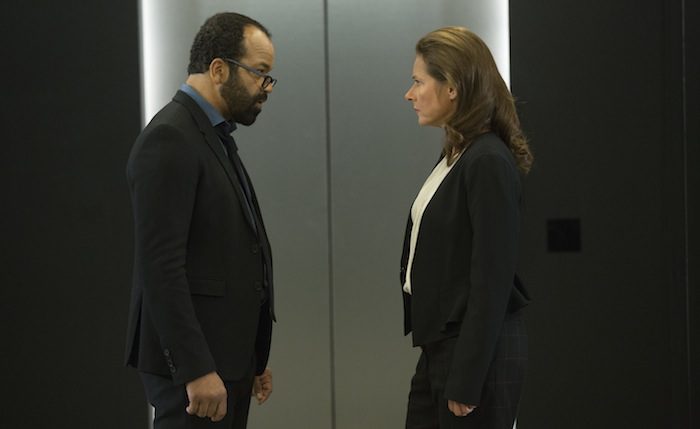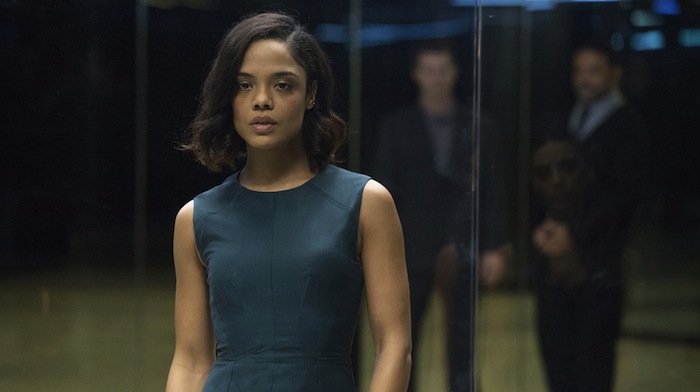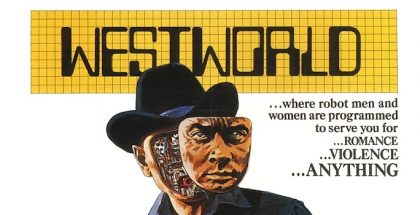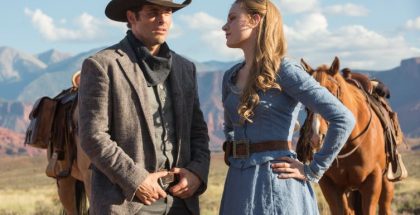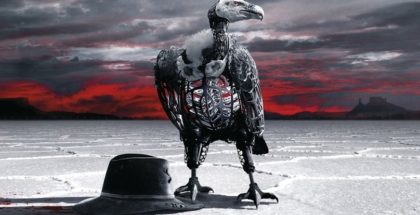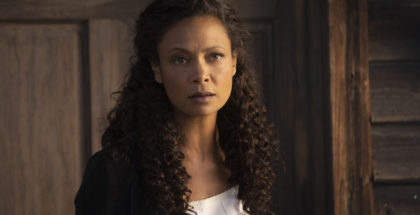UK TV review: Westworld Episode 7
Review Overview
Expectations
8Surprises
8Illusions
8David Farnor | On 16, Nov 2016
Warning: This contains spoilers. Not caught up with Westworld? Read our spoiler-free review of Episode 1.
“It doesn’t look like anything to me.” Those are the crucial words we hear in Episode 7 of Westworld, as the show delivers its best revelation to date.
The episode’s title is “Trompe L’Oeil”, which translates as a trick of the eye, the optical illusion of depth. And, sure enough, that’s what the entire show has been; a constant trick of the eye, challenging us to spot the optical illusion that blurs the line between real people and robots designed to appear like real people. The trick? The hosts are subject to the same illusion; in the words of Ford, they’re programmed not to see what harms them.
So when Bernard (Jeffrey Wright) takes Theresa (Sidse Babbett Knudsen) into Ford’s (Anthony Hopkins) home to show her his latest disturbing discoveries about the behind-the-scenes goings-on, and she can see a door into Ford’s basement lab and he can’t, you might well see what’s coming. In fact, a lot of people have done all season, with the most popular fan theory finally being proven right: Bernard is a host.
That we’ve doubted the idea, while also secretly suspecting it at times, is testament to how incredible Jeffrey Wright’s performance is: we open this episode with dreams of his son dying, as they read (yes) Alice in Wonderland to each other. And it’s a moment so wrought with grief, pain and suffering that you immediately buy that it’s real. Later, he even reaches the same conclusion as us: that the hosts in Westworld are more sympathetic, complex and lifelike than the humans.
“The longer I work here, the more I think I understand the hosts,” says Bernard. “It’s human beings who confuse me.”
It’s a fact that we’ve admired for some time – a feat of style and tone that has helped the writers to keep the wool over our eyes for seven episodes. Even Wright’s stylised, almost Christopher Walken-esque delivery of dialogue makes him seem human and mechanical at the same time.
It’s a great piece of casting, also helping to make his and Theresa’s relationship more believable. How crushing, then, that we see him kill her – by literally crushing her skull against a wall in Ford’s lab. She can’t quite believe it, but that’s because she’s created her own optical illusion this episode: she and Charlotte (Tessa Thompson) plot together to demonstrate that Ford’s reveries in the hosts have caused them to become unpredictably violent. Bernard and Ford, though, both see through their interference in the code to create artificial anarchy – they stand by, calmly, as we see a woman violently killed, a disturbing sight that reinforces how ruthless this park has become; in its attempts to both control and assimilate life, it only ends up acting out things that are all too recognisable in the real world and in modern entertainment. While Charlotte and Theresa fire Bernard, as what Charlotte calls a necessary “blood sacrifice” to appease the people at the top, all they’ve done is trick themselves into thinking they have any control over what happens in Westworld.
Not that we need a reminder of Charlotte’s unconvincing behaviour. When she meets Theresa earlier, she does so by inviting her to her room, just as she indulges in some human-host bondage – the kind of thing that no real person would ever do. (It turns out that Theresa was sending her data to Charlotte and the board, so they could have an emergency repository of data, as back-up for when they try to get rid of Ford. Although judging by Hopkins’ dishevelled hair and maniacal grin, that ain’t happening any time soon.)
With the Bernard-is-a-host theory turning out to be correct, what of the other major theory we spoke of last episode? We catch up with William (Jimmi Simpson), as he (aka. The Possible Young Man in Black) and Dolores hop on a train through dangerous “Ghost Nation” territory (read: cowboy-and-indian-style conflict). While the train they’re on is cool and armoured, the real excitement comes from seeing our couple finally get it on – something that’s as revealing about him as it is her. What’s curious is his changing attitude towards the place, that the theme park is somehow more free than reality. It’s a scary sentiment, because it recalls exactly what Ford believes, that the humans are the ones who are trapped – that the hosts are the ones who are free… under his control.
Ford’s speech comes with a side order of extra intrigue, thanks to his mention of the gods needing “a blood sacrifice” – the same thing Charlotte said to Theresa earlier. Just how well do those two really know each other? And is she actually a host too? (That would be better, after all, than being a badly written human.)
The whole climax continues to set your brain cogs whirring, as we see the blueprint for Bernard, along with the blueprint for Dolores, sitting in Ford’s lab. Combine that with the notion of a dual-timeline narrative and things begin to fall into place. Which brings us to the other theory that’s doing the rounds: that Bernard is, on some level, the consciousness of Arnold put into a host by Ford, following his old partner’s death. What if the conversations between Bernard and Dolores that we’ve seen all season have actually been between Arnold and Dolores? What if the flashbacks to Bernard’s wife and son also belong to Arnold? That would explain how they can feel so real and genuine, why Dolores and “Bernard’s” conversations are so full of Alice in Wonderland readings – and also why all the conversations between Bernard and Dolores have been in Ford’s lab basement.
It’s a dangerous thing to speculate about your favourite TV show, as discovering you were right all along can ruin the fun of a plot twist. But while Mr. Robot’s second season suffered from that mild disappointment, Westworld’s revelation this episode proves that it can more than live up to any hype, expectation or theory – a sign of genuinely brilliant TV programme.
All the while in the background, we see another robot being created – and it’s not a huge leap to presume that it’s a host to replace Theresa, allowing Ford to retain control of his park. As Ford says, he and the board have always managed to come to some kind of arrangement in the past. It just turns out that his arrangements mostly seem to involve homicide. With her intelligence dials turned up to max, Maeve (Thandie Newton), who keeps stalking through the corridors of Westworld’s upstairs (and spies Sylvester performing a nasty factory reset on her friend from the saloon), will prove a formidable adversary to Ford. But as tantalising as that prospect is, with all the theories so far so plausible, will there even be any humans left by the end of the season? Either way, we can’t wait to see it unfold.
Westworld Season 1 is available to watch on-demand through Sky Box Sets. Don’t have Sky? You can also stream it live and on-demand on NOW, as part of a £7.99 monthly subscription. The contract-free service includes access to a range of Sky channels, from Sky 1 (Arrow, Supergirl, The Flash) and FOX UK (The Walking Dead) to Sky Living (Divorce) and Sky Atlantic (Westworld, The Young Pope). A 7-day free trial is available for new subscribers.
Where can I buy or rent Westworld online in the UK?
Photos: ©2016 Home Box Office, Inc. All rights reserved.


